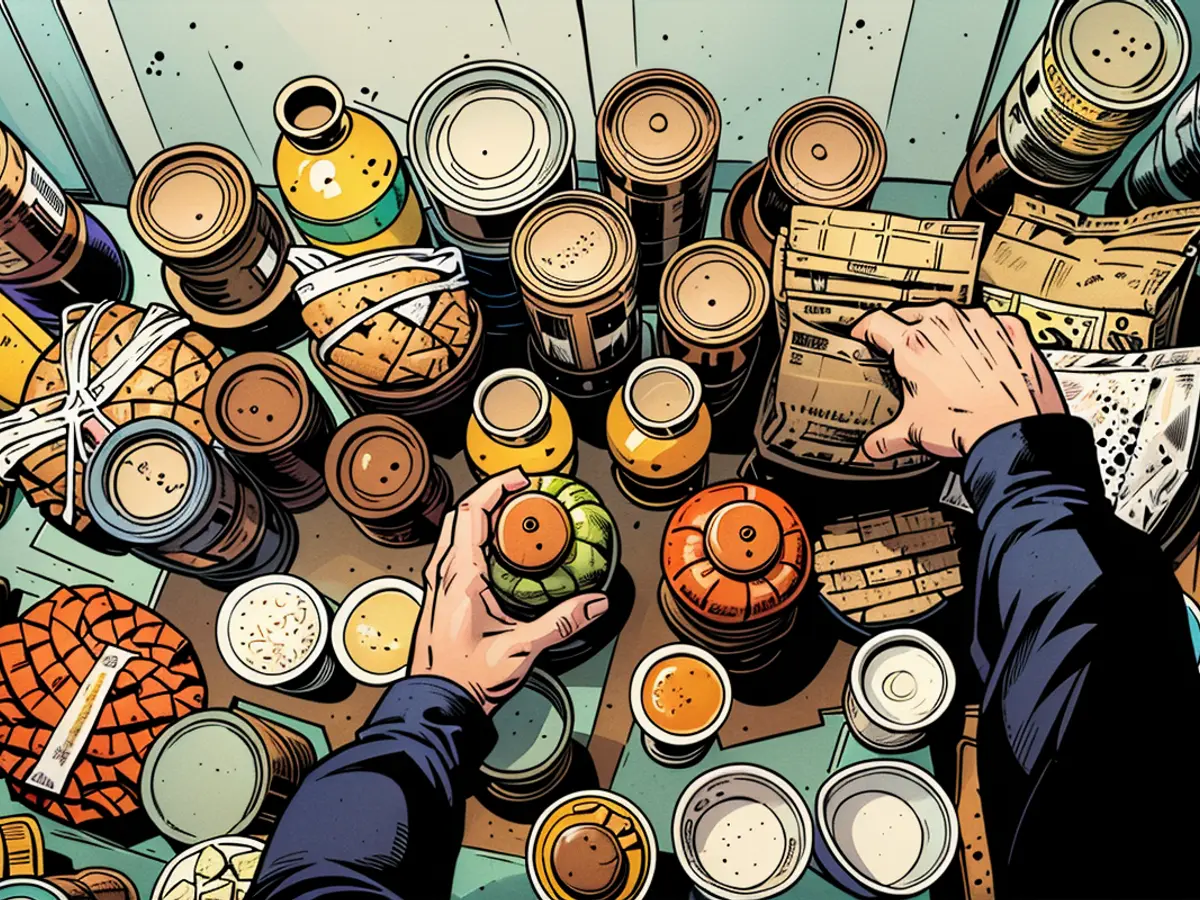Stockpiling Food Is a Concern: Crucial Facts You Should Be Aware Of
In retrospect, Ceridon confesses her past practice of secretly stockpiling extra food. Now, she values equitable food distribution when sharing.
During the pandemic, Ceridon and her sister conversed about the necessity to avoid hysteria and excessively purchasing food supplies.
"We've experienced food scarcity, and now amidst another period of scarcity, it instills a tremendous amount of anxiety," expressed Ceridon, proprietor of Life Love Cheese, a grazing board business in Boston.
Individuals often find satisfaction in a well-stocked pantry for themselves and their family. However, when the food surplus becomes excessive, hidden, or overly precious upon spoilage, it might indicate food hoarding, experts suggest.
An estimated 2% to 6% of individuals grapple with hoarding disorder, according to the International OCD Foundation, a charitable organization helping people with obsessive-compulsive disorder. Among these disorders is food hoarding.
Approximately 75% of these individuals have additional mental health issues, such as major depressive disorder, social anxiety disorder, or generalized anxiety disorder, the foundation states.
Establishing an emotional bond with food and finding comfort in its availability is natural, said Kate Daigle, a licensed professional counselor and certified eating disorder specialist in Denver.
However, for people with obsessive-compulsive disorder, a history of food scarcity, or other traumatic past experiences, the impulse to accumulate food can become debilitating, said New York psychologist Dr. Alexis Conason.
What is food hoarding?
The practice of food hoarding can vary based on a person's ability to purchase food, Daigle stated.
For young kids, it may involve concealing food from parents or caregivers in their rooms or closets, sometimes consuming it but often not, she noted.
"It's simply having it there for emotional security, stemming from a sense of emotional deprivation or scarcity mindset surrounding food," Daigle explained. "Not necessarily literal food deprivation, but perhaps an emotional sense of deprivation."
For adults or kids with financial means, it can mean procuring large quantities of food and occasionally keeping it in concealed locations, Daigle added.
Why is hoarding food unfavorable?
Discussing food hoarding after the lockdowns caused by the Covid-19 pandemic is intriguing, given that food hoarding served a purpose during that time, Daigle said.
However, for many Americans, excessively stockpiling food in cellars, pantries, or entire homes is needless, she stated.
An obsession with hoarding food may result in financial hardships when all money is spent on food and essential needs are neglected. There are also sanitation and health concerns when the food spoils, Daigle explained.
In addition, there are concerns regarding mental health and social relationships, she added. People engaging in food hoarding behaviors might isolate due to shame or feel more comfortable being around food rather than in public.
Why do people hoard food?
The instinct to store more food than required at a given moment shares similarities with a survival mechanism in nature, said Dr. Erin Rhinehart, a neuroscience professor at Susquehanna University in Selinsgrove, Pennsylvania.
"It evolved as an insurance against famine," she explained.
Many animals have developed mechanisms to conserve food for their survival, she clarified.
"If an animal actually experiences a shortage of food, that behavior increases," Rhinehart said. "It's essentially an insurance policy or a way to ensure that you'll never run out of food."
Food hoarding might have underlying issues in common with – but not necessarily cause – eating disorders, Daigle said.
"It's not about the food. It's about the behavior," she stated. Some eating disorders feature food hoarding as part of their behaviors, and the same experience may encourage people to cope with both hoarding and eating disorder behaviors, she added.
Many people with these behaviors may have experienced significant childhood trauma.
"Perhaps there was a genuine scarcity of food resources for the family, and the child might hoard whatever food they could," she said. As adults, people might continue hoarding food out of fear of another scarcity.
However, shortages of other resources kids need may also lead to food hoarding, Daigle stated.
"It could be where food is controlled, or a child's emotional needs are unmet," she said.
Security and stability are not guaranteed in families experiencing addiction, physical or emotional abuse, or neglect, she added.
"That can lead to holding onto comfort objects, whether it's food or other sentimental items, to compensate for those unmet needs," Daigle said.
Curiosity and Empathy
Food hoarding often results in shame and compels individuals into isolation, so remember to approach loved ones you believe might be hoarding with curiosity and empathy instead of judgment, Daigle advised.
Instead of focusing on the surprising nature of their behaviors, ask about their emotional journey, she suggested.
If you notice this behavior in yourself, remember there are ways to improve, Daigle said. The next step is to locate professional support to address deep traumas and unfulfilled emotional needs so you can replace food hoarding with healthier coping mechanisms, she concluded.
The professional you engage should not be a diet coach or someone who judges you based on your food choices, however. Instead, search for a licensed professional experienced in trauma, eating disorders, OCD, anxiety, and compulsive behaviors, she suggested.
"What's crucial to consider is the impact this matter is having on your daily routine and happiness," Conason pointed out. "If it starts hindering your favorite activities or affecting your overall well-being, it's high time to consider getting some assistance."
Read also:
Ceridon, recognizing the impact of food scarcity on her anxiety, now advocates for fair food distribution and avoids excessive stockpiling, focusing on wellness and mental health.
Food hoarding can often stem from past experiences of emotional or literal food deprivation, leading individuals to seek emotional security through well-stocked pantries, according to Kate Daigle.








